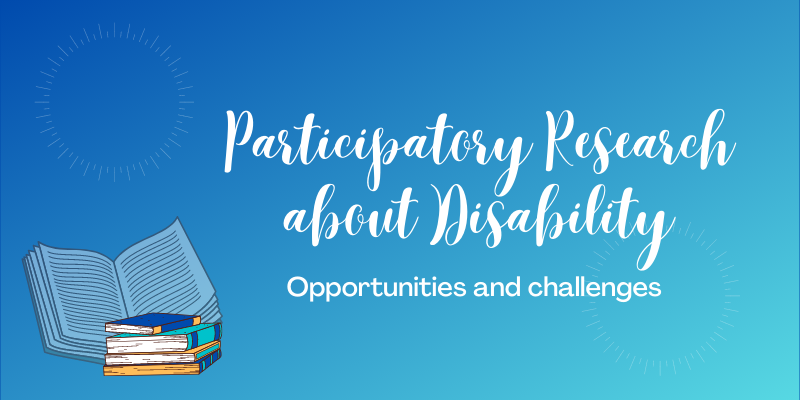
On May 12th the Swedish research network for critical disability studies, KritFunk, will host an online conference on ‘Co-production research in disability studies: opportunities and challenges’.
Although the conference is primarily directed at a Swedish audience we welcome international attendees to partake as well.
Sign up: Link to Eventbrite (opens in new tab).
Background
From an international perspective, Swedish disability research lags in co-production research, that is, methods where the subjects of the research are active in the research process.
The purpose of this conference is two-fold:
1. To increase the knowledge of participatory research methods within disability research.
2. To facilitate the exchange of ideas between researchers and representatives from disability organisations.
The conference is open to researchers and the general public with the aim of increasing visibility of disability rights issues generally and specifically to highlight co-production research. Our hope is that the conference will be a platform to enable cooperation between researchers and the disability movement. It is our intention that this will strengthen the relation between research and disability rights work as well as raise awareness of the importance of co-production research in the public discourse, political realm and organisational development, and the relevance of including subjects of the research in the research process.
The organisers of this conference are from KritFunk, a Swedish network for disability studies. We belong to a new generation of researchers who are inspired by the international research of Critical Disability Studies. The aim of the network is to serve as a platform for further development of methods and theoretical perspectives, for example in this conference’s case, co-production research.
Through the network’s international contacts, we have invited researchers from Britain, Germany and Iceland who have used co-production research. Following each research presentation, panels consisting of Swedish researchers and representatives from disabilities rights originations will discuss the relevance of these methods, in a Swedish context, and how cooperation using similar methods can be formed.
The Conference is digital and is organised in cooperation with Lunds University and Stockholm University, and Begripsam, a disabled people-led organisation working on and researching issues related to accessibility (among other things).
Agenda
9.15–9.30: Intro och info (in Swedish, with simultaneous spoken interpretation to English)
9.30–10.15: Barrier-Free Communication in Tertiary Education in Germany: The Case of Deaf and Hard-of-Hearing Students and Faculty (in English, with simultaneous English captioning)
By Anja Werner, Universität Erfurt, Germany
10.15–10.30: Pause
10.30–11.15: Becoming colleagues through inclusive research (in English, with simultaneous English captioning)
By Kristín Björnsdóttir and Ragnar Smárason, University of Iceland
11.15–11.30: Pause
11.30–12.00: Panel discussion (in Swedish, with simultaneous spoken interpretation to English)
12.00–13.00: Lunch
13.00–13.45: Why Can’t We Dream? Co-producing Stories of our Own Lives (in English, with simultaneous English captioning)
By Sally Whitney-Mitchell, Katy Evans and Kirsty Liddiard
13.45–14.00: Pause
14.00–14.45: Reflections on partnership working: Exchange or exploitation? (in English, with simultaneous English captioning)
By Sarah Earle, The Open University, UK
14.45–15.00: Pause
15.00–15.30: Panel discussion (in Swedish, with simultaneous spoken interpretation to English)
15.30–16.00: Ending, questions (in Swedish, with simultaneous spoken interpretation to English)
Description of keynote presentations
Barrier-Free Communication in Tertiary Education in Germany: The Case of Deaf and Hard-of-Hearing Students and Faculty
By Anja Werner, Universität Erfurt, Germany
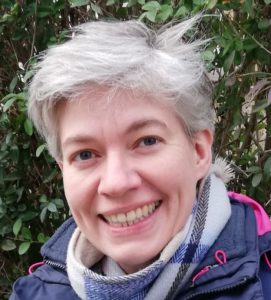
On the basis of her historical research, Anja Werner has developed an interest in language barriers in education especially for sensorially-impaired persons. At the University of Erfurt, she is actively involved in organizing history teaching and research activities in an inclusive way so that d/Deaf students and scholars may participate. A work group formed in the spring of 2021 comprising hearing and hearing-impaired faculty and students affiliated with the history department. In regular, barrier-free meetings we have defined challenges and solutions, which we are now prioritizing. As a first step, we are developing a class to raise awareness of barriers in academia with a special focus on people with hearing-impairments. In this class to be offered in the spring term 2022 for the very first time, we will also test and discuss solutions, like live transcriptions (both automated and by actual human beings). A great discovery was Etherpad, which we originally used only for live transcriptions, but for which we have since discovered additional uses that make teaching more accessible to all. The latter point was a somewhat surprising finding: reducing barriers does not simply mean higher costs and making amends to a few persons with special needs. It actually raises the quality of teaching for all concerned. Moreover, once possible solutions are being discussed, an intriguing array of possibilities may be discovered. As a next step, we will develop concepts for workshops to be offered to other universities and interested businesses in order to train specific groups of professionals. A publication is in preparation.
Becoming colleagues through inclusive research
By Kristín Björnsdóttir, professor and Ragnar Smárason, project manager, both at the University of Iceland
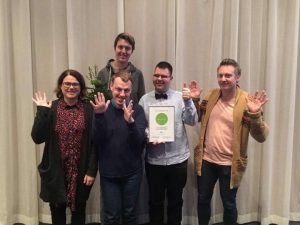
In our presentation we will talk about our collaboration which started in January 2015. Kristín is a professor at the university of Iceland and had access to research funds and was able to hire Ragnar to work with her on a research project about equality and people with learning difficulties. We will describe how we went from the status of non-disabled researcher and disabled collaborator to a better balanced status of colleagues. We will discuss why that was important to us and to our research project. We will offer advice on how to successfully carry out inclusive research and which pitfalls to avoid.
Why Can’t We Dream? Co-producing Stories of our Own Lives
By Katy Evans, Sally Whitney-Mitchell & Kirsty Liddiard, researchers from the University of Sheffield, UK
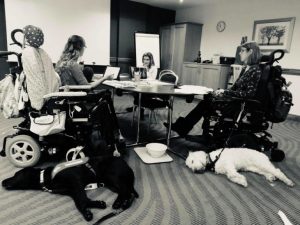
In this talk, we detail the politics and practicalities of co-produced disability research with disabled young people. We centre an arts-informed, co-produced research project – Living Life to the Fullest (ESRC 2017-2020, University of Sheffield) – that has brought together a Co-Researcher Collective of disabled young people. Co-production is an established approach; however, our collaborative approaches as a diverse team have led us to develop inclusive research practices that engage with virtual, narrative and artistic social research methods in innovative ways.
Reflections on partnership working: Exchange or exploitation?
By Sarah Earle, the Open University, UK
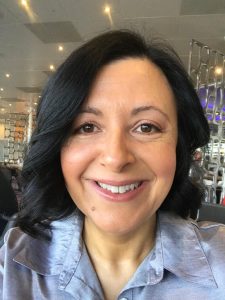
What does it mean to work ‘in partnership’? What does it take to work in partnership effectively? In the UK, there is a strong imperative to work collaboratively across boundaries and in partnership in the pursuit of research, but within a highly competitive funding environment that shapes our engagements and collaborations.
In this talk I will explore my reflections of establishing networks and partnerships within several research projects including (1) the establishment of The Sexuality Alliance, a multi-disciplinary, multi-professional consortium of organisations working to support sex and intimacy for young people with life-limiting and/or life-threatening conditions; (2) a project exploring the unintended consequences of COVID-19 pandemic control measures on young adults who are life-limited/life-threatened and (3) a project exploring contraceptive decision-making for women with learning disabilities.
Sign up: Link to Eventbrite (opens in new tab).

Cecilia Pettersson
Jag deltar gärna i er spännande konferens men måste tyvärr avvika efter lunch.